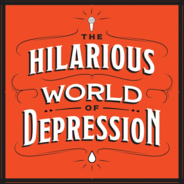
Gesundheit, Wellness & Beauty
The Hilarious World of Depression Folgen
A show about clinical depression...with laughs? Well, yeah. Depression is an incredibly common and isolating disease experienced by millions, yet often stigmatized by society. The Hilarious World of Depression is a series of frank, moving, and, yes, funny conversations with top comedians who have dealt with this disease, hosted by veteran humorist and public radio host John Moe. Join guests such as Maria Bamford, Paul F. Tompkins, Andy Richter, and Jen Kirkman to learn how they’ve dealt with depression and managed to laugh along the way. If you have not met the disease personally, it’s almost certain that someone you know has, whether it’s a friend, family member, colleague, or neighbor. Depression is a vicious cycle of solitude and stigma that leaves people miserable and sometimes dead. Frankly, we’re not going to put up with that anymore. The Hilarious World of Depression is not medical treatment and should not be seen as a substitute for therapy or medication. But it is a chance to gain some insight, have a few laughs, and realize that people with depression are not alone and that together, we can all feel a bit better. American Public Media and HealthPartners’ Make It Okay campaign are committed to breaking the stigma around mental health.
Folgen von The Hilarious World of Depression
-
Folge vom 12.11.2018Adventures in TherapyTrue stories of beautiful epiphanies and majestic, horrible disasters. Talk therapy is one of the most popular ways to address depression and it's one of the most effective. Still, at its root, talk therapy is a relationship between two humans -- strangers, mostly -- trying to figure out something complicated together, and that is inherently complicated. Our listeners have stepped up to provide true life tales of therapy gone comically bad and therapy that worked out great. You'll hear about dogs, Flag Day, awkward online dating, painful wedding photos, and even a wedgie.Check out our sponsor this week:Calm – Get 25% off a Calm Premium subscription when you visit calm.com/world
-
Folge vom 05.11.2018Guy Branum Goes to Minnesota, Gets Good Internet, Finds SelfComedian and writer Guy Branum was expected to be a construction worker his whole life. Maybe a football player. He was large, strong, and grew up in a town more known for agriculture than metropolitan sophistication. After scoring good grades and pining for places usually seen in the movies or magazines, he moved on to college and then law school in Minnesota, where he was able to come out as gay and realize that his interests were way more tilted toward comedy than the practice of law. What's it like to find yourself after suspecting you don't belong anywhere?Check out our sponsor this week:Care/Of - TakeCareOf.com and use promo code HILARIOUS at checkout for 25% off your first month of personalized Care/of vitamins
-
Folge vom 29.10.2018The Hilarious NIGHT of DepressionOur show took to the stage recently for a live event packed with laughter, insight, and music. We were joined by Paul F. Tompkins, Aimee Mann, Ted Leo, and Ana Marie Cox, who all shared their experience with mental illnesses as well as what it's like to be out and about in the world with people knowing what they've gone through. We spin through the hilariously depressing world of Google Reviews in Google Review Theater, take a visit to an O. Henry marriage therapist, and even hear a little about how this very program got started.Check out our sponsors this week:Stitch Fix -- stitchfix.com/HILARIOUS
-
Folge vom 22.10.2018Words: Am We Uses Them Good At Mental Health?Finding and using the right words for something as complex as mental illnesses can be exasperating. And it can take a lot of effort to avoid the wrong words. In this episode, using words, we explore terms like "crazy" or "addiction" or "depression" and how they are so often abused, co-opted, and twisted. Guests include Paul F. Tompkins, Aimee Mann, Ted Leo, Ana Marie Cox, as well as licensed therapist Emily Bulthuis, who discusses the benefits of accurate terminology and how to gently approach those who misuse mental health words.
